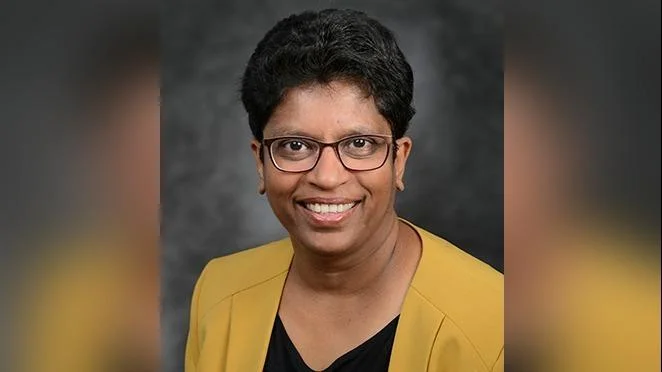Madhavi Marasinghe CIO | University of North Dakota
Madhavi Marasinghe CIO | University of North Dakota
Madhavi Marasinghe, the University of North Dakota’s Chief Information Officer, spoke at the 18:83 Speaker Series on Oct. 15, sharing her perspective on leadership and overcoming challenges in technology fields.
Marasinghe highlighted the underrepresentation of women, particularly women of color, in educational technology roles. She noted that women make up 38% of the workforce in education technology, but only 23% of chief information officers are women. Among CIOs, fewer than 3% are women of color.
She addressed how these statistics once intimidated her until she began to see her background as a strength. “Born and raised in Sri Lanka, our culture is community-oriented,” Marasinghe told those gathered at the Memorial Union Social Stair. “What that means is we are not individualistic. When we think things through, we think about the ‘us’ and ‘we’ and the community, instead of ‘me’ and ‘I.’”
Marasinghe explained that this outlook shifted her understanding of leadership from personal advancement to serving the broader community. This approach helped her navigate professional spaces where she was often an outlier.
Discussing her decision to join UND nearly a decade ago, Marasinghe described it as her biggest career risk. “When I applied, it was advertised that there was no budget and no staff,” she said. UND’s IT structure was decentralized at the time, creating uncertainty about how to move forward.
“All of my colleagues questioned why I was taking this on without any staff without a budget or structure, and how I was going to get it done,” Marasinghe remarked. “My answer was, ‘That is exactly why I want this job, because I know I can put structure to this place. I know I can work with the people to get it to where it needs to be.’”
Marasinghe used UND’s focus on community as a framework for leading what has become a centralized university IT department over almost ten years.
She encouraged others to find their own unique strengths: “Dig deep, dig it out, and use it in these kinds of situations,” she said.
Marasinghe also spoke about building relationships as vital for leadership influence and shared personal stories about stepping outside comfort zones—such as learning to swim later in life—to illustrate resilience and humility.
“Learning to swim after all these years took a lot out of us,” Marasinghe said. “We failed publicly, with so many kids and their parents watching us … but you’re at least trying something.
“We were committed, we kept going, and we saw some progress.”
She emphasized that tackling new experiences fosters humility and growth throughout one’s career.
Marasinghe also discussed managing stress through meditation—a practice she adopted during the pandemic—which helps maintain calm during crises: “I’ve learned a lot from that,” she said. “Slow down and breathe. When you’re stressed or frustrated, you can feel your heartbeat. I learned to listen to my heartbeat and my mind to know when to calm down, and meditation gave me the tools to be as close to the ‘center’ as possible.”
She continues this routine before work each day: “After five years, I still practice meditation before coming to work,” she said. “It helps me reset. In times of crisis, it keeps me grounded. Inner peace will allow you to respond instead of react.”
Finally, Marasinghe referenced tennis player Billie Jean King’s idea that pressure should be viewed as a privilege.



 Alerts Sign-up
Alerts Sign-up